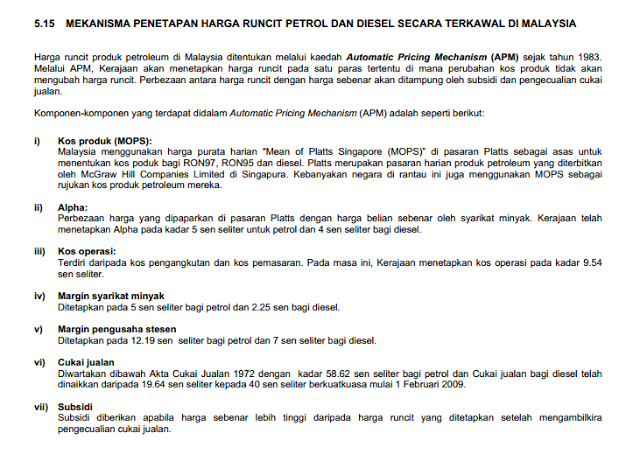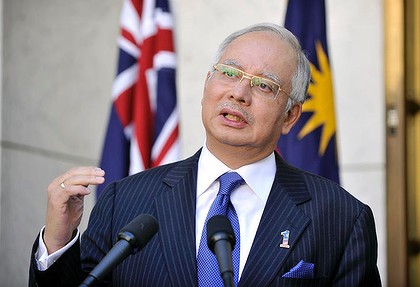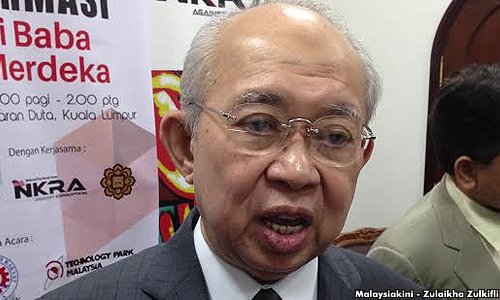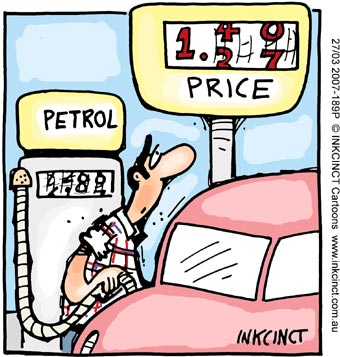A Simple Guide To Help You Understand The Upcoming Managed Float System For Petrol Prices
Economists say this is the best time to implement the managed float system for RON95 and diesel as global crude oil prices is at its lowest, but what happens if and when those prices increase?
Did the announcement of the 1 December 2014 abolishment of petrol subsidies shock you? With the removal of subsidies, price of RON95 and diesel will be determined by a managed float system, a concept that has caused much confusion.
The managed float system is based on the monthly average world price of crude oil. This means the retail price of RON95 and diesel will increase and decrease according to the fluctuation of global market prices.
Under the managed float, similar to that now used for RON97, retail prices would be based on the monthly average world price of crude oil.
thestar.com.myDomestic Trade, Cooperatives and Consumerism Minister Datuk Seri Hasan Malek said the average price difference in the cost of the fuels in a month would determine the retail prices for the following month. “This means, if the price of world crude oil increases, so will retail prices of RON95 and diesel and vice-versa. We monitor the world oil price every day to get the average price. “So for Dec 1 prices, we will calculate the average price between Nov 20 to Nov 30 and make the necessary announcement,” he said.
thestar.com.myCiting an example, Hasan said under the managed float the retail prices of RON95 would have been RM2.27 per litre based on the average oil price between Nov 1 and 19, which was lower than the RM2.30 set through the APM. “If this trend continues, it is expected that the retail price of RON95 for December will be lower. “The prices would, however, be rounded to the nearest figure and if we based on the example, it will be RM2.30 per litre,” he added.
thestar.com.myThis system is not new to Malaysia. It was first introduced in 2010 for RON97. The retail price for RON97 did not see drastic fluctuation from the retail price of RM2.75.
Petroleum Dealers Association Malaysia deputy president Datuk Zulkifli Mokti. said the managed float system for RON97, introduced in 2010, did not see much fluctuations. “In the past few months, its price had been stagnant at RM2.75 despite the drop in the world’s oil prices. Recently, it went down to RM2.50. “So, I don’t expect much fluctuations for RON95, too.”
Khairy Jamaluddin explains that Malaysia uses MOPS to determine the cost price of petroleum products. The cost price is then added with operation costs, and margins of oil companies and petrol dealers to get the retail price.
Harga petrol di Malaysia dikira mengikut formula yang dikenali sebagai Automatic Pricing Mechanism atau APM. Harga rujukan bagi kiraan APM adalah Mean of Platts Singapore (MOPS). Ini merupakan harga minyak yang sudah diproses.
 facebook.com
facebook.com
Harga MOPS dicampur pula dengan beberapa kos lain:
- Kos operasi (9.58 sen/liter)
- Margin syarikat minyak (5 sen/liter)
- Margin dealer stesen minyak (12.19 sen/liter)
- 'Alpha' yakni perbezaan MOPS dengan harga pembelian sebenar (5 sen/liter)
Jadi dengan mudah:
MOPS + 9.58 sen + 5 sen + 12.19 sen + 5 sen = harga pasaran sebenar petrol di Malaysia
 facebook.com
facebook.com
Purata harga MOPS untuk RON95 dari 1 hingga 19 November adalah 195.15 sen. Campur dengan kos lain diatas = 226.88 sen atau kurang lebih RM2.27. Maksudnya, bila kita apungkan harga petrol pada 1 Disember dan tren penurunan harga pasaran minyak berterusan, ada kemunkinan besar harga petrol RON95 turun. Subsidi dijimat, harga pun boleh turun.
 facebook.com
facebook.com
However, PKR's Rafizi Ramli decries this system as it means the rakyat will be bearing the burden of guaranteeing the profits of oil companies and petrol dealers
The government's move to scrap the fuel subsidy and base the prices of RON95 petrol and diesel on a managed float system starting next month means that the rakyat will have to bear the extra burden of guaranteeing the profits of oil companies and petrol dealers, a PKR lawmaker said today.
Party secretary-general Rafizi Ramli said this was because under Malaysia's version of the managed float system, about 30 sen was padded into the per litre cost of petrol and diesel, which was for profits guaranteed to oil and gas companies and petrol dealers. This covers their costs of transportation, distribution, marketing and operations and also protects them from global price fluctuations.
He said this was unlike other countries which had an open market system where the costs were only pegged to the Means of Platts Singapore or MOPS. Rafizi said that MOPS was the price of petrol and diesel which is refined and traded through Singapore, adding that this was usually the base price taken while the rest was left to the market to determine. "Therefore in an open market, oil companies use MOPS only, so it is up to them to undercut their competition and sell cheaper," he said.
Rafizi added that if Putrajaya was going to expose the people to fluctuations of crude oil prices in the world market, it should also remove protection for the oil companies. He said that the managed float system was the same as the automatic pricing mechanism (APM) practised in the country since the 1980s where the only difference now was the removal of subsidies for the rakyat. He said that under the APM, while the margins of oil companies and petrol dealers were guaranteed, subsidies for the public were in place, which made it a fair system.
Prime Minister Najib says not only will consumers benefit from lower fuel prices with this system, the government would also be saving RM10 billion to RM20 billion annually
Consumers will directly benefit from the managed float system effective December 1 for Ron 95 petrol and diesel, by way of lower prices, Prime Minister Datuk Seri Najib Razak said. "With savings of between RM10 billion (to) RM20 billion annually, we can for sure increase allocations to those sectors deemed important in the context of the country's socio-economic development.
"The agricultural, rural development, education and health sectors are among those for which we can increase allocations, as they all are directly linked to the wellbeing of the people. "At the same time, the government is implementing the managed float system to provide direct benefits in the face of declining global fuel prices. If it goes down further, we can make adjustments according to the prevailing global market prices."
Najib, who is also finance minister, said the method would also educate the people that the rise or fall in fuel prices in the country did not depend on the government, but the global market. "Fuel entails a bulk subsidy, so the rich get bigger benefits from those in the lower-income group, alongside the widespread smuggling, and then tourists also come and buy our petrol. "So, the fuel subsidy has a lot of leakage and losses," he added.
Chiming in that the government's decision to implement the new system is timely are Former Finance Minister Tengku Razaleigh Hamzah, Alliance Research chief economist, and The Associated Chinese Chambers of Commerce and Industry of Malaysia's (ACCCIM)
Former finance minister Tengku Razaleigh Hamzah has come out in support of the government's move to scrap the fuel subsidy and base the RON95 petrol and diesel prices on a managed float system from next month, saying it could help ease the burden on the people at a time of rising prices. "This is the best time for the government to abolish the fuel subsidy because global crude oil prices have fallen to USS$80 (RM268.40) a barrel," the Gua Musang MP said.
The Associated Chinese Chambers of Commerce and Industry of Malaysia's (ACCCIM) President Datuk Lim Kok Cheong said in a statement that it was the right time to remove fuel subsidies and the move would allow government to strike a balance in the interest of the people and reduce the country's deficit.
Alliance Research chief economist Manokaran Mottain said without subsidies, Putrajaya could save more than RM20bil in operating expenditure for the next 12 months, provided the current price of oil remained over the next 12 months. “It is a timely move as the lower oil prices are affecting the nation’s revenue,” he said. About 30% of the nation’s income comes from oil and the current market price of less than US$80 a barrel has resulted in a drop in revenue. “Removing subsidies will compensate for the decrease in revenue.” “Our fuel subsidy bill in 2013 was over RM20bil. If we eliminate that and prices are floated with no subsidy, we stand to save a lot.”
thestar.com.myPetroleum Dealers Association Malaysia says NOW is a good time to adopt the managed float system as world's market price for crude oil is at its lowest. However, the government should have a contingency plan should market prices start to increase.
If the world’s crude oil prices continue to hover around the current rate, the move to adopt the managed float system for the retail prices of RON95 and diesel will be well-received by consumers, said Petroleum Dealers Association Malaysia deputy president Datuk Zulkifli Mokti. He said the new mechanism was a good move as the world’s market price for crude oil was at the lowest currently. “At this rate, the government subsidy is almost zero. “I assume the new mechanism was announced based on the present price.
“However, if the price goes up, there are bound to be objections.” He said the government, however, could adjust the system to accommodate the affordability of consumers if prices started to increase. Zulkifli said the system would be proven to be effective only if there was enough liquidity for the government, the dealers and the consumers to carry on with their daily lives and routines.
According to Deputy Finance Minister Datuk Chua Tee Yong, the government is working on a mechanism to intervene if global crude oil prices rise too high
The government will intervene if global crude oil prices rise too high to cushion the impact on RON95 petrol and diesel, said Deputy Finance Minister, Datuk Chua Tee Yong. “However, the intervention mechanism has not been finalised yet, and the evaluation process being undertaken by the Domestic Trade and Consumer Affairs Ministry, is still ongoing.” Chua said the government’s move to let market forces determine fuel prices, via a managed float system, was to enable consumers to enjoy the current downtrend in global oil prices, reported Bernama.
Petroleum Dealers Association of Malaysia (PDAM) president cautioned that the new mechanism could be exploited if the prices increase
Petroleum Dealers Association of Malaysia (PDAM) president Datuk Hashim Otham, however, cautioned that the new mechanism could be exploited. “If the price goes up, there is a possibility of manipulation by certain quarters as they may store their fuel to be sold at a higher price the next day. “If the price goes down, they would try to sell off their load today, so that they would not incur losses the next day.” he said.
Economists also say that as fuel prices is dictated by market forces, the nation's inflation would also be uncertain as it follows the uptrend and downtrend of fuel prices
The government’s decision to remove subsidy for RON95 and diesel effective Dec 1 will move the country to closer to market pricing for these fossil fuel, which may or may not have an impact on inflation depending on the movement of global fuel prices.
Economist contacted said this will allow some uncertainties to the country’s inflation as fuel prices are no longer fixed but will now be determined through world market prices. Alliance Research chief economist Manokaran Mottain said by allowing fuel price to be dictated by market forces, inflation would also follow the uptrend or the downtrend of the price. “Inflation is likely to be same at current prices. If there is a drop in overall crude oil prices, the inflation will be lower. It depends on the trend. Current trend remains constant,” he told The Malaysian Reserve.





